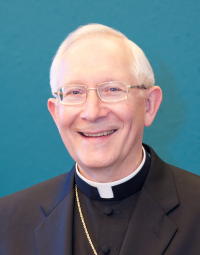
Archbishop Leonard P. Blair
It’s that time of year when the Church has traditionally focused on what lies beyond this life, the fate that awaits every person, inasmuch as we do not cease to be even when our physical body dies.
On Nov. 1, we will celebrate All Saints’ Day, venerating those who are in heaven. On Nov. 2, we will observe All Souls’ Day, praying for those of our deceased who still have to face some purification before entering heaven. Since we cannot see or know ourselves as God sees and knows us, it is an ancient instinct of Catholic piety, firmly rooted in Scripture and tradition, that we commend to the mercy of God all those who have passed from this world. When I die, I certainly want the benefit of Masses and prayers offered for the repose of my soul.
The church traditionally has spoken of what are called the “Four Last Things”: death, judgment, heaven and hell. These constitute the moment of our passing from this world and what awaits us, keeping in mind that heaven and hell are eternal while purgatory is not, since it is a purification that leads a soul to heaven.
When we consider the moment of death, we cannot trivialize the freedom God has given us or the reality of sin by simply imagining or presuming a happy outcome, no questions asked! By prayerfully meditating on all four of the “Last Things,” we can hopefully arrive at a more thoughtful, prayerful and honest consideration of our life and where we are headed.
DEATH –For a human being with an immortal soul, death is not just a biological, physiological phenomenon dictated by the laws of nature. Death, the Catechism says, is the end of our earthly pilgrimage, during which God offered us his grace and mercy so that we can work out our earthly life in keeping with his divine plan and decide our ultimate destiny. Mortality should make us realize that we have only a limited time in which to respond to Christ’s call for us to “repent and believe.” For those who die in Christ’s grace, death is a participation in his death so that they can also share his resurrection.
JUDGMENT – Some of the greatest art in the world, Michelangelo’s for example, in the Sistine Chapel, depicts the last judgment, which will be God’s triumph over the revolt of evil after the final cosmic upheaval of this passing world. But at the very moment of our individual deaths there comes what the Catechism calls “the eternal retribution” received by the soul of each of us in accordance with our faith and works (or lack there-of ); either entrance into the blessedness of heaven — immediately or through purification (purgatory) — or immediate and everlasting damnation in hell.
HEAVEN – Heaven means eternal life with God, a communion of life and love with the Most Holy Trinity and with all the saints. It is the great banquet spoken of in the New Testament Book of Revelation and anticipated at every Mass when the priest says: “Blessed are those called to the supper of the Lamb!” Pope Benedict once compared heaven to being plunged into an infinite ocean of eternal joy. And we remember the words of St. Paul: “Eye has not seen, or ear heard, what God has prepared for those who love Him.”
HELL – It is important to note with the Catechism that hell is a state of definitive self-exclusion from communion with God and the saints. It is the lot of those who refuse by their own free choice to turn away from sin and believe, even at the moment of their death. And lest we wonder “who would possibly self-exclude from God?” We have to remember that sin, adamantly chosen, can create a blindness and a hardness of heart such as Christ witnessed among those who rejected him even in the face of all his grace-filled words and astounding works. The devil is real and is always at work to deceive and to ensnare us with falsehood and evil.
There are many challenges to sound teaching today, and forgetfulness of fundamental truths can lead to spiritual ruin. May we take to heart the “Four Last Things” as the Church presents them to us, for our salvation and the salvation of the world.
